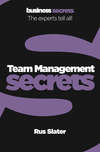Читать книгу: «Getting Things Done»
Collins Business Secrets – Getting Things Done
Copyright
Collins
A division of HarperCollinsPublishers Ltd.
1 London Bridge Street,
London SE1 9GF
First published in Great Britain in 2010 by HarperCollinsPublishers
Published in Canada by HarperCollinsCanada. www.harpercollins.ca
Published in Australia by HarperCollinsAustralia. www.harpercollins.com.au
Published in India by HarperCollinsPublishersIndia. www.harpercollins.co.in
FIRST EDITION
Copyright © HarperCollinsPublishers 2010
SECRETS and BUSINESS SECRETS are trademarks of HarperCollinsPublishers
Rus Slater asserts the moral right to be identified as the author of this work.
A catalogue record for this book is available from the British Library.
CONDITIONS OF SALE
This book is sold subject to the condition that it shall not, by way of trade or otherwise, be lent, re-sold, hired out or otherwise circulated without the publisher’s prior consent in any form of binding or cover other than that in which it is published and without a similar condition including this condition being imposed on the subsequent purchaser.
All rights reserved under International and Pan-American Copyright Conventions. By payment of the required fees, you have been granted the non-exclusive, non-transferable right to access and read the text of this ebook on screen. No part of this text may be reproduced, transmitted, downloaded, decompiled, reverse engineered, or stored in or introduced into any information storage and retrieval system, in any form or by any means, whether electronic or mechanical, now known or hereinafter invented, without the express written permission of HarperCollins ebooks
HarperCollinsPublishers has made every reasonable effort to ensure that any picture content and written content in this ebook has been included or removed in accordance with the contractual and technological constraints in operation at the time of publication
Source ISBN: 9780007324460
Ebook Edition © MARCH 2010 ISBN: 9780007360413
Version: 2018-07-16
Table of Contents
Cover Page
Title Page
Copyright
Author’s note
Getting things done is the way to get on in life
Knowing what things to do
1.1 Check your bank balance of time
1.2 Ask for clear instructions
1.3 See the relevance of the bigger picture
1.4 Identify what’s relevant to you
1.5 Do the ‘right’ things right
1.6 Plan for output, not activity
1.7 DREAM to get more done
1.8 Have a personal vision or mission
1.9 Know WIIFM
1.10 Make ‘to do’ lists
Knowing how to do things
2.1 Decide if ‘how’ is important
2.2 Fit into a bigger process
2.3 Find out how others do it
2.4 Set quality measures
2.5 Know how to KISS
Knowing when to do things
3.1 Prioritize this – or that?
3.2 Look at effort versus pay-off
3.3 Go for quick wins
3.4 Use your body clock
3.5 Schedule your tasks
3.6 Schedule for task dependency
3.7 Schedule for resource dependency
3.8 Schedule for concurrent activity
3.9 Use your waiting time
Working to your plan
4.1 Deal with people distractions
4.2 Deal with other distractions
4.3 Use technology
4.4 Beware the Seven Wastes of Time
4.5 Manage your meetings
4.6 Fight fatigue
4.7 Practise ‘good housekeeping’
4.8 Avoid procrastination
4.9 ‘Sharpen the saw’
Saying “no”
5.1 Don’t say “yes” to every request
5.2 Just say “no”
5.3 Use 5Y questioning
Dealing with problems
6.1 Assess risks sensibly
6.2 Manage risks well
6.3 Define problems
6.4 ‘Appreciate’ problems
6.5 Choose a quick fix, then a long fix
6.6 Find the root cause
6.7 Learn how to improvise
Asking others to do things
7.1 Work to YOUR strengths
7.2 Influence others
7.3 Give good instructions
7.4 Learn the art of delegating
7.5 Use WIIFYs
7.6 Say “thank you”
7.7 Learn from doing
Jargon buster
Further reading
About the Author
About the Publisher
Author’s note
This book is dedicated to Margaret Ellen Slater
(1922–2009)
Getting things done is the way to get on in life
If you want to get on in your career or your home life you will need to get things done. In the modern world, however, there are lots of different people wanting lots of different things to be done, and you can’t do everything for everyone unless you get much better at a number of different things.
I’ve been working for over 15 years with individuals and organizations to help them to find ways of getting more done. This ranges from teams with enormous workloads and tight deadlines to individuals simply looking to improve their productivity. I’ve learned many secrets and tricks over the years. Some I’ve discovered myself, but many I’ve learned from others; humans are wonderfully inventive.
This book aims to help you to get better at managing your life to allow you to get more of the things done that you need to get done. It contains 50 secrets, grouped into seven themed chapters. If you follow the secrets you will find that you amaze yourself at how much you can actually achieve!
“If we did all the things we are capable of doing we would truly astound ourselves”
Thomas Edison (1847–1931), American inventor
The seven themed chapters are:
• Knowing what things to do. You need to know what it is that needs to be done. You also need to be happy that you are doing the ‘right’ thing.
• Knowing how to do things. Sometimes you have to do things in a way that is laid down by the organization; other times it is up to you.
• Knowing when to do things. You aren’t likely to have just one thing to do – you probably have loads, so you need to know how to prioritize tasks.
• Working to your plan. You know what and how you want to work, but people keep distracting you. How do you manage distractions so that you can get things done?
• Saying “no”. You could get it all done if only people wouldn’t keep asking you to do other things. You need to learn when to say “no”.
• Dealing with problems. You thought you could do that job in an hour, but something has gone wrong. Here’s how to prevent and solve these problems.
• Asking others to do things. Sometimes the best way to do something is to get someone else to do it for you. This shows how you can successfully enlist the help of other people.
Learn the secrets of planning, prioritizing and managing workloads.
Knowing what things to do
Firstly it is critically important to recognize that you are responsible for your own destiny. This chapter aims to help you set out your personal mission or vision, to recognize the value of using your time wisely and to develop some foundation strategies to help you manage your time. You need to ensure that the things you do are of value both to you and to your organization.
1.1 Check your bank balance of time
Imagine you have an account at a bank where you automatically get credited each morning with $86,400. Every evening the bank takes back whatever part of the balance you failed to spend during the day. Nothing can be carried over or transferred. What would you do? Well, I’d try to spend every cent, and I bet you would too!
You do have such a bank account; at the ‘Bank of Time’. Every morning, it credits you with 86,400 seconds. Every night it debits whatever portion of this total you have failed to invest to some ‘good’ purpose.
“The Future is something which everyone reaches at the rate of sixty minutes an hour, whatever he does, whoever he is” C.S. Lewis, English author
“Dost thou love life? Then do not squander time, for time is the stuff life is made of.”
Benjamin Franklin (1706–90), a Founding Father of the USA
If you fail to use the day’s deposit, the loss is yours. There is no going back. You need to use this deposit wisely so as to get from it the utmost in business success, health and happiness. Use it so as to get the most done.
The clock is running, and you need to make the most of your time. Think about the value of these units of time:
• The value of one year. To recognize the value of a year, ask a student who failed to achieve the grade.
• The value of one month. Ask a mother who gave birth to a premature baby.
• The value of one week. Ask the person who edits the weekly newspaper.
• The value of one hour. Ask the people sitting waiting for someone vital to join a meeting.
• The value of one minute. Ask the person who just missed their train and so failed to make an important presentation.
• The value of one millisecond. Ask the person who won the silver medal.
If you should have done something and you didn’t, you can’t have the time back! So learn to make the most of it.
Remember that time waits for no one.
1.2 Ask for clear instructions
Often people can be a bit vague when they are giving instructions or explaining what they want. This may not appear to be much of a problem at first, but it can lead to a lot of wasted time. If someone asks you to do something for them, make sure you are 100% certain about what’s required.
1 Whenever possible, get a written instruction or request; the act of writing down instructions makes people think more carefully and fully about what they actually want. It also saves you having a difference of opinion later about what was said and heard.
2 Whether written or spoken, try to get the request in as much specific detail as possible. For instance, “Pick me up outside the west door of the HSBC Bank”, rather than “Pick me up at the bank.”
3 Getting it done late is no good; you need to know the deadline for the job to be done. Again, make sure you get specific detail: “by 5.30pm on Friday afternoon” rather than “by Friday” or “this week” or “as soon as possible”.
one minute wonder Before you start on any task, make sure you know the What, Where, When and How of the job you are about to undertake. If you don’t, you will quite possibly end up wasting all the time you spend.
At work there may be specific quality standards to be achieved. For example, your manager wants a report on sales to date this year, broken down by product and region and cross referenced by sales person. The report is needed by 5pm on Friday the 12th of July.
Ok, those were your instructions, which on the face of it seemed clear, with a specific deadline. However, is there really enough detail about how the report should be submitted? You shouldn’t be starting on this task until you know the specific details, such as:
• Is it in draft form or final form?
• Is it to be in a specific format (for example a company template)?
• Does it need to feed into other standard company forms?
If the person giving the instructions doesn’t offer all the essential detail, then you are going to have to ask. Never be shy about asking for more detail. The best way to start is to repeat back your understanding of the instruction to the person who gave it to you. That’s what pilots do!
See also Secret 7.3 when you need to give good instructions.
Getting it right first time is always better than having to come back and do it again.
1.3 See the relevance of the bigger picture
People often talk about the ‘bigger picture’, often meaning the strategy of the organization or overall purpose. You need to know how what you are doing is contributing to the ‘bigger picture’ and moving the organization closer to that final goal.
It is really easy to simply accept any instruction from your superiors as being ‘right’: not something to question, but something just to do, even if you can’t see its relevance.
It isn’t necessarily a criticism of your boss if you question an instruction; it may be simply that you want to understand how the instruction fits into the overall purpose of the organization. Understanding this increases your commitment to doing it and doing it well, whereas if you are doing something that, quite literally, has no point you will quickly become disillusioned. Likewise, it is valuable to recognize how doing something that doesn’t benefit the organization is potentially valueless to them, therefore making you (or at least your job) unnecessary.
What is important is to ensure that you check the relevance to the bigger picture in a way that doesn’t seem to be critical of your boss. Opposite are some tips on how to do this.
one minute wonder You may have to do a mix of tasks, some of which are relevant to the bigger picture and some of which are irrelevant. Make sure you know the level of importance to attach to the irrelevant ones.
1 Approach your boss in private, not in front of other people, when you want to check the relevance of the tasks requested of you.
2 Ask ‘open’ questions, which cannot be answered simply with a “Yes” or “No”. Ask how, why, what, where and who questions rather that do/does, will, can. For example, “I need to understand how this contributes to the departmental sales activity” or “Where does this feed into the manufacturing process?”
3 If necessary ‘sell’ the benefits to the manager of taking the time to explain this: “I want to do this job really well for you, so can you explain…” or “If I understand the value of this task, I can ensure that it gets the priority it deserves…”
4 If the task isn’t actually relevant to the bigger picture, but the boss still wants it done, ask what its priority is in relation to the tasks you have that are relevant.
5 Thank your boss for explaining it. You’ll quickly ‘train’ your boss to ensure that you only get relevant tasks without asking!
Knowing how your tasks relate to the bigger picture helps both you and your boss to organize the workload.
Бесплатный фрагмент закончился.
Начислим
+7
Покупайте книги и получайте бонусы в Литрес, Читай-городе и Буквоеде.
Участвовать в бонусной программе











